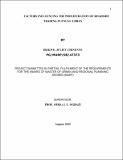JavaScript is disabled for your browser. Some features of this site may not work without it.
Factors Influencing the Proliferation of Roadside Trading in Enugu Urban
Ibekwe, Juliet Chinenye
Date:
2015-08
Abstract:
Enugu has witnessed an unprecedented increase in the influx of commercial activities on their major roads with each of them competing for an accessible location to display their goods and also access their customers. This indiscriminate display of goods has resulted in disorderliness, chaotic traffic congestion, drainage blockage, indiscriminate conversion of adjoining land-uses to commercial activities, increased noise pollution, reduction in access road width, poor and inadequate parking, visual intrusion and social crime. The fact that most neighbourhoods have functional markets in and around them would generally presuppose that no road side trading will be seen in the area, unfortunately this is not the situation. The desire to actually understand the factors that have been behind the proliferation of these major roadside trading in the area in spite of these markets has remained the concern of this study. This study therefore aims at empirically determining the factors influencing the proliferation of roadside trading in Enugu urban centre with a view to appreciating the reasons for the emergence of roadside trading and evolving ways to manage or curb this continuous emergence. The objectives were to: (i) examine the nature of road side trading in the study area, (ii) identify the factors that contribute to the emergence of roadside trading in the study area, and (iii) determine whether these factors differ among the various residential densities in the study area. Two research hypotheses were postulated in the study. Survey research design was adopted in this study. Both primary and secondary data were used in the study. Primary data were collected with the aid of structured questionnaire and observation. Stratified, purposive and simple random sampling techniques were adopted in the study to determine the sample population and the residential density areas selected in the study. The sample frame includes roadside traders along the selected major roads, residents (women at home) and environmental professionals. Three neighbourhoods that have high volume of roadside activities were selected from each of the three residential densities in Enugu urban. A total of 950 copies of questionnaire were administered and collected in the study. Principal Component Analysis and analysis of variance were used to test the hypotheses at 0.05 significance level. The study revealed that majority of the road-side traders do not conform to planning standards while doing their trading activities as well as not staying at areas designated for commercial activities. Four factors spur people to road side trading in the study area and these include: location, economic, accommodation, and social factors. It was recommended among others that there should be policies that should be put in place to address unemployment in the society and that government should provide corner shops at different strategic areas in the neighbourhoods
Files in this item
This item appears in the following Collection(s)
Search UNNSpace
Browse
-
All of UNNSpace
-
This Collection
